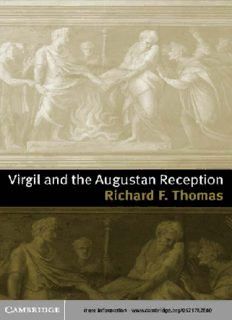Table Of ContentThis page intentionally left blank
VIRGIL AND THE AUGUSTAN RECEPTION
This book is an examination of the ideological reception of Virgil at
specific moments in the last two millennia. Following Tennyson’s
evaluation of Virgil – ‘‘Thou majestic in thy sadness|at the doubtful
doom of human kind’’ – Richard Thomas first scrutinizes the Virgil
tradition for readings that refute contemporary dismissals of the puta-
tive post-Vietnam Angst of the so-called ‘‘Harvard School,’’ then de-
tects the suppression of such readings in the ‘‘Augustan’’ reception,
e¤ected through the lens of Augustus and the European successors of
Augustus who constructed Rome’s first emperor – and Virgil – for
their own political purposes. He looks at Augustus in the poetry of
Virgil, detects in the poets and grammarians of antiquity alternately a
collaborative oppositional reading and an attempt to suppress such
reading, studies creative translation (particularly Dryden’s), which re-
asserts the ‘‘Augustan’’ Virgil, and examines naive translation which
can be truer to the spirit of Virgil. Scrutiny of ‘‘textual cleansing,’’
philology’s rewriting or excision of troubling readings, leads to read-
ingsbybothsupportersandopponentsof fascismandNationalSocial-
ism to support or subvert the latter-day Augustus. The book ends
with a diachronic examination of the ways successive ages have tried
to make the Aeneid conform to their upbeat expectations of this poet.
richard thomas is Professor of Greek and Latin at Harvard Uni-
versity.Heisthe authorof Landsand PeoplesinRomanPoetry (1982),a
two-volumecommentaryonVirgil’sGeorgics(1988)andReadingVirgil
and his Texts (1999). He has also published more than fifty articles and
reviews on Hellenistic Greek and Roman poetry.
VIRGIL AND
THE AUGUSTAN
RECEPTION
Richard F. Thomas
HarvardUniversity
ab
The Pitt Building, Trumpington Street, Cambridge, United Kingdom
The Edinburgh Building, Cambridge CB2 2RU, UK
40 West 20th Street, New York, NY 10011-4211, USA
477 Williamstown Road, Port Melbourne, VIC 3207, Australia
Ruiz de Alarcón 13, 28014 Madrid, Spain
Dock House, The Waterfront, Cape Town 8001, South Africa
http://www.cambridge.org
©Richard F. Thomas 2004
First published in printed format 2001
ISBN 0-511-01650-6 eBook (netLibrary)
ISBN 0-521-78288-0 hardback
For Joan, Sarah and Julia,
so often the companions of this work,
and in memory of John Wald
ibi omnis e¤usus labor
CONTENTS
Acknowledgements ix
Prologue xi
Introduction: the critical landscape 1
1 Virgil and Augustus 25
2 Virgil and the poets: Horace, Ovid and Lucan 55
3 Other voices in Servius: schooldust of the ages 93
4 Dryden’s Virgil and the politics of translation 122
5 Dido and her translators 154
6 Philology and textual cleansing 190
7 Virgil in a cold climate: fascist reception 222
8 Beyond the borders of Eboli: anti-fascist reception 260
9 Critical end games 278
Bibliography 297
Index 313
vii
ACKNOWLEDGEMENTS
I have been fortunate to have had the opportunity to test my ideas on
a number of occasions, and to have profited from discussion on those
occasions with faculty and students of a number of institutions, in
particular the Universities of Colorado, Go¨teborg, Oslo, Pittsburgh,
Washington, Georgetown, Rice, Emory, Boston University, the
Vermont Classical Association, the Universities of Florida, South
Carolina, and Pennsylvania, Corpus Christi College, Oxford, the
University of Florence, and of Venice, the Virginia Classical Associ-
ation, the University of Tennessee and Bryn Mawr. It is my pleasure
to single out those colleagues whose invitations gave me the oppor-
tunity to share my ideas on these occasions, namely Ariana Traill,
Monika Azstalos, Egil Kraggerud, Hans-Peter Stahl, Michael Hal-
leran, Alex Sens, Harvey Yunis, Peter Bing, Patricia Johnson, Mary
Ann Hopkins, Gareth Schmeling, Ward Briggs, Joe Farrell, Stephen
Harrison, Emanuele Narducci, Mario Geymonat, Cathy Dougherty,
David Tandy and Celia Schultz.
On each of these occasions, and at other times, I was fortunate to
have good discussion with more colleagues than I can now remem-
ber, some of whom also read and commented on parts of the work.
With apologies to those whose contribution I may have omitted
(numeros memini, si verba tenerem), I would single out, in addition to
those just named, Alessandro Barchiesi, Ewen Bowie, Brian Breed,
Francis Cairns, Kathy Coleman, Denis Feeney, Don Fowler, Alain
Gowing, Jasper Gri‰n, Albert Henrichs, Stephen Hinds, Christina
Kraus, Leah Kronenberg, Christopher Jones, Nico Knauer, Mario
Labate, Hugh Lloyd-Jones, Oliver Lyne, Greg Nagy, Robin Nisbet,
James O’Donnell, Tim O’Sullivan, Victoria Paga´n, Lee Pearcy, Chris
Pelling, David Ross, Andreola Rossi, Thomas Schmidt, Zeph Stew-
ix
Description:This book examines the ideological reception of Virgil at specific moments in the past two millennia. It focuses on the emperor Augustus in the poetry of Virgil, detects in the poets and grammarians of antiquity pro- and anti-Augustan readings, studies Dryden's 1697 Royalist translation, and also na

